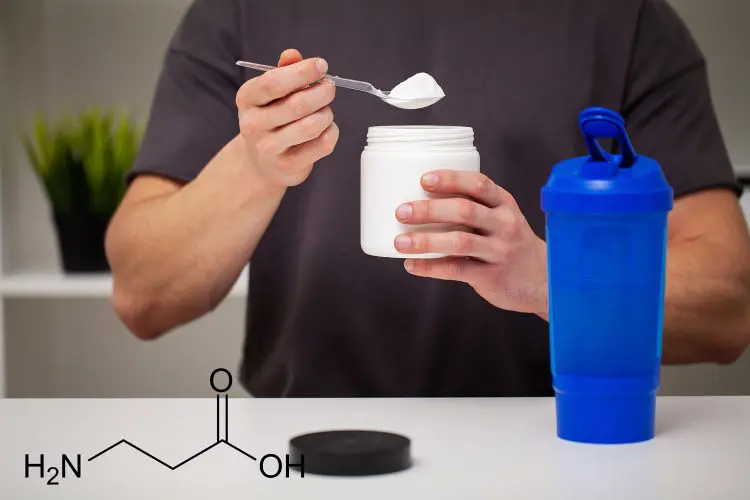If you’re a workout fanatic, then you have heard about beta-alanine before. You may have taken it without realizing it, but don’t worry it is safe to consume. It is scientifically proven to help you during short high-intensity workouts.
Most dietary supplement manufacturers add this along with a long list of other ingredients into their products. The purpose of adding beta-alanine to their products is to improve cardiovascular performance in the gym. Beta-alanine isn’t only found in fitness supplements though. It can be found in foods such as poultry, asparagus, watercress, meat, and soybeans.
You may ask “well, does beta-alanine work? Is beta-alanine safe for me to use?” We will get to those questions soon. First, let’s start with the basics and find out how beta-alanine became one of the most popular supplements in the fitness industry.
What is Beta-Alanine?

Beta-alanine is produced naturally in the body, but sometimes you may need to supplement it to provide yourself an extra boost of energy during the end of your set.
Beta-Alanine is a non-essential amino acid that is synthesized by the liver and then converted into protein. It doesn’t work like the other amino acids that synthesize protein. Instead, it combines with histidine which produces carnosine.
Carnosine is the key thing we should focus on with this beta-alanine topic. Carnosine is the end product that is stored in our muscles.
According to research, beta-alanine may help with having a longer and healthier workout during resistance training. So, in other words, it may help improve aerobic capacity and power output during exercise.
Beta-alanine is most effective during short high-intensity activities. That is the reason why most gym-goers consume beta-alanine because it helps with muscle growth.
Research states that beta-alanine may significantly reduce fatigue and limit lactic acid buildup in the muscles. This will possibly allow you to work out harder and longer due to the extra energy, you will have in the muscles.
According to a study from the International Society of Sports and Nutrition, “Daily supplementation with 4 to 6 g of beta-alanine for at least 2 to 4 weeks has been shown to improve exercise performance, with more pronounced effects in open end-point tasks/time trials lasting 1 to 4 min in duration” (Trexler, 2015). For every new food or supplement you try to add to your diet, please consult with your doctor before consuming beta-alanine.
How Does Beta-Alanine Help With Exercising?
If you are going all out in every gym session, then beta-alanine will be that little helper to give you a longer and harder workout. If you are someone who hasn’t been going all out at the gym the past few weeks, then the benefits of beta-alanine wouldn’t be as helpful.

Beta-alanine works in a weird way and the science behind it will be discussed in this article later on.
If you aren’t pushing yourself to your limits in the gym, then beta-alanine won’t do much for you. Your mindset should be focusing on putting in the work in the gym. Once you feel like you need some help to perform an extra 3-5 reps, supplement with beta-alanine.
Beta-alanine is mostly beneficial if you are pushing yourself to the edge during your workouts. Unfortunately, you have a hard time adding an extra rep for muscle hypertrophy. That’s where beta-alanine comes in to do its job.
A beta-alanine supplement will aid you in cranking out a long and intense workout. It will improve your performance just a little bit, but that extra boost could be the reason you max out on the bench press for your next gym session.
Let’s put it into perspective, imagine you’re in the gym doing some bicep curls. A few things are happening at this moment. One, you might have some lurkers admiring your gains. Two, and most importantly, when you contract your bicep, little micro-tears are occurring in your bicep.
This is your muscle breaking down due to the stress and tension you’re putting it through. As you are onto your 8th repetition in your set, you start to feel a burning sensation in your bicep. This is called lactic acid. Lactic acid then turns into lactate which leads the bicep to feel more fatigued. This is where the amazing beta-alanine comes in. Carnosine will act as a buffer to keep the acidity in your muscles lower. By reducing the acid buildup caused by lactate, your bicep will feel less fatigued.
What Is Carnosine?
Beta-alanine produces carnosine (1). That’s a compound in the body that helps increase muscle endurance in high-intensity exercises. Once you take these, your muscles will be fatigued far less quickly. Why would we want more carnosine during our workout?
Simply put, it helps with regulating acid build-up known as lactic acid. The buildup of that acid leads to muscle fatigue. You’ll know this feeling when you’re doing squats or bicep curls. Towards the end of the set, you will start feeling that burning sensation within your muscles.
The Benefits of Beta-Alanine
Beta-alanine comes with many benefits for those who are into fitness. As mentioned before, this supplement comes in clutch when you need it the most. The fact that it reduces the fatigue feeling helps us improve in many areas of our fitness. One of the things that it does is help build muscle.
Builds Muscle
Beta-alanine indirectly helps you build muscle over time. This is because it allows you to get an extra rep in your set at the gym. It even lets you go an extra minute or two during your intense HIIT workout. The idea of getting an extra rep in by using beta-alanine is why it helps improve body composition.
One study by the Journal of the International Society of Sports Nutrition showed that supplementing beta-alanine for three weeks increased lean muscle mass. This is due to the increase in training volume and intensity that will promote muscle growth (2).
Improves Aerobic Capacity
This will be the same concept as building muscle. Instead of getting in an extra rep at the gym, you’ll be adding an extra 5 minutes to your intense cardio training. This will eventually improve your overall cardiovascular endurance.
In a 2009 study, a double-blind test was performed between two groups of moderately to well-trained cyclists. This study was to determine if beta-alanine will give the athletes a performance boost at the tail end of their races. The results were that the beta-alanine group increased their power output by 5.0%. As stated by the study, “Oral beta-Alanine supplementation can significantly enhance sprint performance at the end of an exhaustive endurance exercise bout” (Thienen, 2009).
Gain Strength
A study by the Journal of the International Society of Sports Nutrition shows that beta-alanine supplementation may improve muscular strength in athletes. “β-Alanine supplementation was effective at increasing power output when lifting loads equivalent to the individual’s maximal strength or when working at maximum power output. The improvement observed at 1RM was explained by a greater load lifted, or strength gain, in response to training in the participants who took this supplement” (Maté-muñoz, 2018) (3).
Beta-alanine without working out won’t increase your strength gains. The purpose of beta-alanine is to help you get in an extra 2-5 reps in your set. Increasing your reps over time will eventually improve your muscular strength due to the help of beta-alanine.
Possible Side Effects?
Studies have shown that it can slightly increase the amount of time an individual can perform high-intensity exercises. A side effect of beta-alanine is a tingling feeling throughout the body called paraesthesia. Some people may barely feel it and others may feel it just a bit more.
In a 2014 review sponsored by the Department of Defense, researchers looked at 20 studies with over 200 participants. Aside from paraesthesia, which they noted was not a serious issue, they did not find any short or long-term adverse effects associated with beta-alanine use (4).
High amounts of beta-alanine may lead to oxidative stress which leads to free radicals destroying your cells throughout the body. Lack of beta-alanine may interfere with brain and nerve system function. Beta-alanine may interact with some heart medications like beta-blockers, ace inhibitors, angiotensin 2 receptor blockers. It may also interfere with certain erectile dysfunction medications like Viagra (sildenafil) and Cialis (tadalafil).
Related: Why Does Pre-Workout Make You Itch?
Is Beta-Alanine Right for You?
You can take beta-alanine at any time of the day. Usually, you’ll find beta-alanine in some sort of blend. For example, most pre-workouts in the market have beta-alanine in them. If it’s in all of these supplemental blends, then it must work right?. Well, there are people out there that like the “tingling” feeling that beta-alanine provides.
It gives people the impression that the pre-workout is doing its job because of how beta-alanine is making them feel. Some people may dislike the tingling feeling and avoid beta-alanine altogether. At the end of the day, beta-alanine does work based on many studies that were done on its effects. You would have to decide if this supplement is right and safe for you to get the best out of your workouts.
When Should You Consume Beta-Alanine?
It does not matter when you take a beta-alanine supplement. You can take it in the morning before a workout, or in the afternoon before a workout. It won’t have much impact on your sleep as compared to pre-workouts due to all the chemicals and caffeine the companies add to their products. You could get a beta-alanine supplement in its pure form, add it to a cup of coffee or in any beverage you desire. If you do decide to consume beta-alanine, make sure to consult with your doctor to see if adding more amounts of it is safe for you.
The amount of beta-alanine a person should take is around 2 to 6 grams per day. You can find beta-alanine in pretty much any health food store, supplement store, or online. If you’re reading this and want to try this for your next workout this afternoon or tomorrow then you’ll be able to find it easily. Plus, beta-alanine effects work almost immediately, so you can use the benefits of this supplement right away in your workout.
What Supplement Goes Well With Beta-Alanine?
Beta-Alanine is a popular supplement to add to most fitness products such as pre-workouts due to its proven benefits. Most people would add beta-alanine in their fitness “stacks” to optimize their gym workouts for muscle growth.
One combination you could try is creatine and beta-alanine. Not only you don’t have to worry about the taste of them because they are non-flavored. These two combined could aid you in your intense workout.
We already know the effects of beta-alanine, but what about creatine? To keep it short, creatine gives your muscles more energy while you’re doing strenuous exercises. Creatine is touted to be one of the best supplements out there to improve strength and increase muscle growth.
With that being said, creatine and beta-alanine would be the perfect one-two combo that you need to go all out in the gym and optimize muscle growth. Creatine will fill your muscles and add the energy needed to go heavier than before, beta-alanine will be there to make sure you don’t get fatigued too quickly.
Related: Best Pre-Workouts For Beginners
Is Beta-Alanine Safe to Use?
When we discuss anything about supplements and whether or not we should take them or if it is even right for us to take them. It is always good to consult with your health care provider before trying any new supplement. I wouldn’t recommend children or pregnant women to consume it. There isn’t enough research that determines the safety of beta-alanine supplementation for those individuals.
Researchers have determined that there are no harmful side effects of using beta-alanine for healthy adults. One interesting side effect to be aware of is that researchers have found that it may decrease the production of GABA in the body. GABA is a neurotransmitter found in the brain that helps the body to relax to induce sleep.
If you take beta-alanine at night, it may disrupt your sleep. It isn’t as potent as taking in caffeine, but some individuals may feel the effects of it at night and some may not. If your GABA levels are already low, then beta-alanine may be something you should take earlier in the day.
Tip: If you're signed in to Google, tap Follow.












